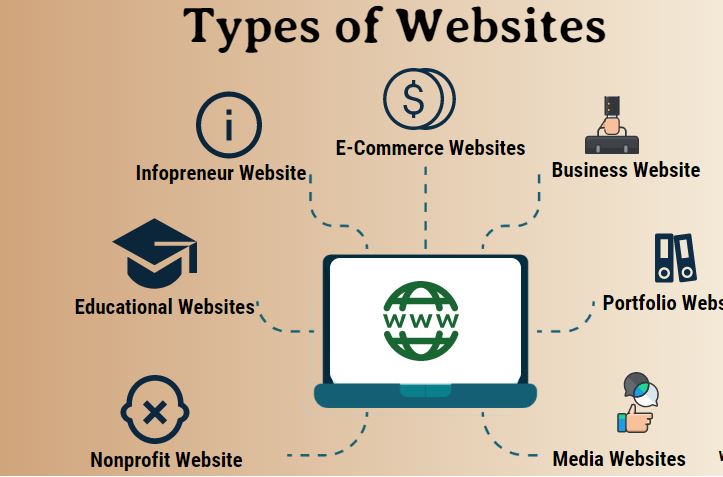What is Infopreneur Website Design:
Designing a website for an infopreneur involves creating a platform that effectively communicates the infopreneur’s brand, showcases their expertise, and provides a seamless experience for users looking for valuable information. Here are some key considerations for designing an infopreneur’s website:
1. Clear Branding:
- Logo and Brand Colors: Use a clean and professional logo with a color scheme that reflects the infopreneur’s brand.
- Consistent Branding: Maintain consistent branding elements across the website, including fonts, colors, and imagery.
2. User-Friendly Navigation:
- Clear Menu Structure: Have a well-organized menu structure that makes it easy for visitors to navigate and find relevant information.
- Search Functionality: Implement a search bar to help users quickly find specific content.
3. Homepage Design:
- Introduction: Clearly communicate the infopreneur’s mission and expertise on the homepage.
- Call to Action (CTA): Include a prominent CTA that encourages visitors to subscribe, download resources, or engage with the content.
4. Content Presentation:
- Clean Layout: Use a clean and uncluttered layout that highlights the most important content.
- Readability: Ensure that text is easy to read with appropriate font sizes and spacing.
- Multimedia Integration: Incorporate images, videos, and other multimedia elements to enhance content.
5. Mobile Responsiveness:
- Responsive Design: Optimize the website for mobile devices to ensure a seamless experience across different screen sizes.
6. Subscription and Email Marketing:
- Opt-in Forms: Include strategically placed opt-in forms to encourage visitors to subscribe.
- Email Automation: Set up email automation to deliver valuable content and nurture relationships with subscribers.
7. Resource Library or Courses:
- Organized Content: If the infopreneur offers courses or resources, organize them logically and make them easily accessible.
- Clear Descriptions: Provide clear descriptions and previews of what each resource/course offers.
8. Social Proof:
- Testimonials: Include testimonials from satisfied customers or clients to build trust.
- Social Media Integration: Display social media feeds or links to showcase a social presence.
9. Contact Information:
- Contact Form: Include a contact form for inquiries or collaboration opportunities.
- Social Links: Provide links to social media profiles for additional contact options.
10. Performance Optimization:
- Fast Loading Times: Optimize images and other elements for fast loading times.
- SEO-Friendly: Ensure that the website is optimized for search engines to improve discoverability.
11. Legal Considerations:
- Privacy Policy and Terms: Include clear privacy policies and terms of service to establish trust and comply with regulations.
12. Analytics Integration:
- Google Analytics: Integrate analytics to track user behavior and gather insights for continuous improvement.
13. Update and Maintenance:
- Regular Updates: Keep the content and design up-to-date to stay relevant.
- Backup Systems: Implement regular backups and security measures to protect the website.
What does “Infopreneur” mean?
An infopreneur, a portmanteau of “information” and “entrepreneur,” refers to an individual who creates and sells information products. Instead of offering physical goods, infopreneurs specialize in packaging and selling information, knowledge, or expertise in various formats. These formats may include digital products, such as e-books, online courses, webinars, tutorials, guides, and other informational resources.
Infopreneurs leverage their expertise in a particular subject matter to create valuable content that meets the needs or interests of a target audience. They often build a business around sharing their knowledge, insights, and skills, and monetize their information products through various channels, such as online platforms, websites, or direct sales.
Key characteristics of infopreneurs include:
- Information-Based Products: Infopreneurs primarily create and sell products that are centered around information, education, or knowledge.
- Expertise: They typically have expertise in a specific niche or industry, positioning themselves as authorities in that particular subject.
- Digital Presence: Infopreneurs often establish a strong online presence through websites, blogs, social media, and other digital platforms to reach and engage with their audience.
- Monetization Strategies: They use various monetization strategies, such as selling e-books, online courses, consulting services, memberships, or affiliate marketing related to their niche.
- Continuous Learning: Infopreneurs are usually committed to continuous learning and staying updated in their field to provide valuable and relevant information to their audience.
What does an infopreneur website do?
An infopreneur website serves as the online platform for an infopreneur to share valuable information, expertise, and knowledge with their audience. The primary goal of an infopreneur website is to provide a central hub where visitors can access, consume, and engage with the infopreneur’s content. Here are key functions and purposes of an infopreneur website:
- Content Delivery:
- Blog Posts: Regularly publishing blog posts or articles to share insights, tips, and information relevant to the infopreneur’s niche.
- Resource Library: Organizing and presenting valuable resources, such as downloadable guides, templates, and checklists.
- Online Courses and Training:
- Course Platforms: Hosting and selling online courses or training programs for individuals looking to learn specific skills or topics.
- Webinars: Conducting live or recorded webinars to deliver interactive and engaging educational content.
- Product Sales:
- E-books and Guides: Selling digital products like e-books or guides that provide in-depth information on a particular subject.
- Merchandise: Offering merchandise related to the infopreneur’s brand or niche.
- Community Building:
- Forums or Communities: Creating a space for audience interaction through forums, discussion boards, or community groups.
- Social Media Integration: Integrating social media feeds or links to foster a sense of community and facilitate discussions.
- Email Marketing:
- Newsletter Sign-Up: Collecting email addresses through opt-in forms for newsletter subscriptions.
- Email Automation: Implementing automated email sequences to nurture leads, share valuable content, and promote products or services.
- Consulting and Services:
- Consultation Services: Offering consulting or coaching services and providing information on how potential clients can engage with the infopreneur.
- Monetization Strategies:
- Affiliate Marketing: Incorporating affiliate marketing links to generate additional income.
- Memberships: Offering premium content or community access through membership subscriptions.
- Branding and Positioning:
- About Me/Us Page: Sharing information about the infopreneur, their expertise, and their story.
- Testimonials: Featuring testimonials or case studies to build credibility and trust.
- Search Engine Optimization (SEO):
- SEO Optimization: Ensuring that the website is optimized for search engines to increase visibility and attract organic traffic.
- Analytics and Performance Tracking:
- Google Analytics: Integrating analytics tools to track website performance, user behavior, and audience demographics.
- Responsive Design:
- Mobile Compatibility: Ensuring that the website is responsive and accessible on various devices, including smartphones and tablets.
How to design an infopreneur in 5 easy steps:
Designing an infopreneur involves creating a platform that effectively communicates the infopreneur’s brand, showcases their expertise, and provides a seamless experience for users seeking valuable information. Here are five easy steps to design an infopreneur:
1. Define Your Brand and Niche:
- Identify Your Niche: Clearly define the specific area or topic in which you have expertise. Knowing your niche helps you tailor your content and design to a target audience.
- Brand Identity: Develop a strong brand identity, including a logo, color scheme, and overall aesthetic that reflects your expertise and resonates with your audience.
2. Create a User-Friendly Website:
- Clear Navigation: Design a user-friendly menu and navigation structure that makes it easy for visitors to find the information they are looking for.
- Mobile Responsiveness: Ensure your website is optimized for mobile devices, providing a seamless experience for users on smartphones and tablets.
- Intuitive Layout: Use a clean and intuitive layout to present information in a structured and organized manner.
3. Develop High-Quality Content:
- Blog Posts: Regularly create and publish high-quality blog posts that showcase your expertise and provide value to your audience.
- Resource Library: Develop a resource library with downloadable content, such as guides, templates, and checklists.
- Video Content: Consider incorporating video content, such as tutorials or webinars, to diversify your content and engage users.
4. Implement Monetization Strategies:
- Choose Monetization Channels: Decide on the monetization strategies that align with your goals, such as selling online courses, offering consulting services, or utilizing affiliate marketing.
- Clear Call-to-Action (CTA): Include clear and strategically placed calls-to-action that guide visitors toward your monetization channels.
5. Build an Engaged Community:
- Social Media Integration: Integrate social media feeds or links to connect with your audience on platforms where they are active.
- Community Forums: Consider adding community forums or discussion boards to encourage interaction among your audience.
- Email Marketing: Build an email list through opt-in forms and use email marketing to nurture relationships, share updates, and promote products or services.
Key qualities of an infopreneur website
An effective infopreneur website should possess key qualities that enhance its functionality, user experience, and overall appeal. Here are key qualities that contribute to the success of an infopreneur website:
- Clear Branding:
- A distinct and memorable logo.
- Consistent use of brand colors and fonts.
- Clear communication of the infopreneur’s mission and expertise.
- User-Friendly Design:
- Intuitive navigation with a well-organized menu structure.
- Responsive design for seamless viewing on various devices.
- Clean and uncluttered layout that prioritizes readability.
- Valuable Content:
- Regularly updated blog or content section.
- Diverse content formats, such as articles, videos, infographics, and downloadable resources.
- Content that addresses the needs and interests of the target audience.
- Monetization Strategies:
- Clearly defined and strategically placed calls to action for products or services.
- Multiple monetization channels, such as online courses, consulting services, or affiliate marketing.
- Transparent information about pricing and payment options.
- Engagement Features:
- Social media integration to facilitate sharing and community building.
- Comment sections on blog posts or a dedicated community forum.
- Integration of interactive elements, such as quizzes or polls.
- Opt-In and Email Marketing:
- Well-placed and compelling opt-in forms for building an email subscriber list.
- Automated email sequences to nurture leads and share valuable content.
- Clearly communicated the benefits of subscribing to the newsletter.
- High-Quality Visuals:
- Professional and high-resolution images.
- Engaging multimedia content, including videos and infographics.
- Consistent use of visuals that align with the brand identity.
- Search Engine Optimization (SEO):
- SEO-optimized content with relevant keywords.
- Proper use of meta tags and descriptions for each page.
- Regular updates and additions to keep content fresh and relevant.
- Community Building:
- Features that encourage community interaction, such as discussion forums or social media groups.
- Testimonials or case studies to build trust and credibility.
- Integration of user-generated content when appropriate.
- Security and Privacy:
- Secure and encrypted payment gateways for online transactions.
- Clear privacy policies and terms of service.
- Regular security audits and updates to protect user data.
- Analytics Integration:
- Integration of analytics tools, such as Google Analytics, to track website performance.
- Data-driven insights to inform content and marketing strategies.
- Monitoring user behavior and traffic patterns.
- Mobile Optimization:
- Ensuring a seamless and optimized experience for users on mobile devices.
- Mobile-friendly navigation and content presentation.
- Accessibility:
- Compliance with accessibility standards to ensure the website is usable by individuals with disabilities.
- Alt text for images and other elements to support screen readers.
Top benefits of becoming an infopreneur Website:
Becoming an infopreneur and establishing a successful infopreneur website can offer various benefits, both professionally and personally. Here are some of the top benefits:
- Monetization Opportunities:
- Diverse Income Streams: Infopreneurs can generate income through various channels such as selling online courses, consulting services, affiliate marketing, sponsored content, and more.
- Scalability: As the audience grows, the potential for income also increases, providing scalability for the business.
- Flexible Work Schedule:
- Independence: Infopreneurs have the flexibility to set their own schedules and work independently.
- Remote Work: Many infopreneurs can work from anywhere, allowing for a location-independent lifestyle.
- Showcasing Expertise:
- Establishing Authority: An infopreneur website serves as a platform to showcase expertise in a specific niche, establishing authority and credibility.
- Building a Personal Brand: The website becomes a central hub for building and promoting a personal brand within a chosen industry or niche.
- Global Reach:
- Audience Reach: The internet enables infopreneurs to reach a global audience, breaking down geographical barriers.
- 24/7 Availability: The website operates around the clock, allowing users to access information and resources at any time.
- Community Building:
- Engagement: Infopreneur websites can foster a community of like-minded individuals through forums, social media groups, and other interactive features.
- Feedback and Collaboration: The community provides a platform for receiving feedback, collaborating with others, and understanding the needs of the audience.
- Personal Fulfillment:
- Sharing Knowledge: Infopreneurs often find fulfillment in sharing their knowledge and expertise with others.
- Impact: Helping others through valuable information can lead to a sense of purpose and impact.
- Continuous Learning:
- Stay Updated: To remain relevant and competitive, infopreneurs must stay informed about the latest trends and advancements in their niche.
- Skill Development: The process of creating content and managing an online business can lead to continuous personal and professional development.
- Passive Income Potential:
- Evergreen Content: Creating evergreen content that remains relevant over time can lead to passive income as it continues to attract visitors and generate revenue.
- Automated Systems: Implementing automated systems, such as email marketing funnels, can contribute to passive income streams.
- Diversification of Income:
- Reduced Dependency: Having multiple income streams from different sources reduces the risk associated with dependency on a single revenue channel.
- Adaptability: Infopreneurs can adapt and evolve their business model based on market trends and audience needs.
- Networking Opportunities:
- Collaborations: Infopreneurs have the opportunity to collaborate with other professionals, influencers, and businesses within their niche.
- Networking Events: Participation in industry events and online forums can lead to valuable connections.
Call now on 8657252221 to talk to Dhanvijay Expert.
Thanks for Reading Our Blog!
#company #llpcompany #registration
https://www.windido.com
Here at Windido, we are tax experts, and we have some excellent general tax tips and tricks designed for your business. Could you chat with us now?
Important Company Hashtag
#corporate #business #events #corporateevents #event #wedding #branding #marketing #covid #party #design #photography #eventplanner #weddings #entrepreneur #love #work #travel #finance #birthday #office #corporatelife #company #india #corporategifts #instagram #art #instagood #windido







Leave a Reply